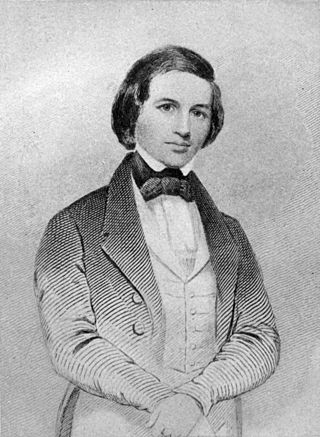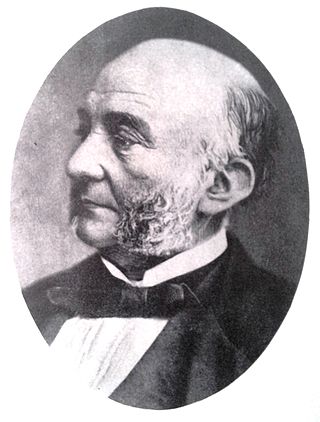
Egidius Benedictus Watermeyer (21 August 1824 - 21 September 1867), informally known simply as "Ben", was a Judge and a founding Member of the Cape Legislative Assembly. [1]

Egidius Benedictus Watermeyer (21 August 1824 - 21 September 1867), informally known simply as "Ben", was a Judge and a founding Member of the Cape Legislative Assembly. [1]
Ben Watermeyer was born into a Cape family of German ancestry (his grandfather was originally from Hamburg). He was the second son of Frederick Stephanus Watermeyer Snr (1797-1847), and Anna Maria Ziervogel. He was a quiet and studious child, who even as a small child was able to correspond with his older brother in Classical Greek. He read law, went to study Civil Law in the Netherlands in 1841, and was called to the bar at the Inner Temple in London in 1847.
In the same year in 1847, he returned to the Cape Colony and was admitted as an Advocate at the Supreme Court. An un-ostentatious but extremely hard-working man, Watermeyer partook in most of the important cases in the late 1840s and gained an extremely detailed knowledge of southern Africa by working the circuit courts.
He married Johanna Catharina Henrietta Reitz (niece of Frederick William Reitz Snr.) The marriage was childless but exceptionally happy.
When the Cape attained its first Parliament in 1854, several Districts requested him to stand as an MP, and he agreed eventually to stand for the District which had asked first - Worcester. He missed the first session (being on circuit) but immediately on taking his seat, he joined the liberal anti-government party of Saul Solomon, William Porter, John Molteno and John Fairbairn (whom he greatly admired). With several of these colleagues, he helped frame the Standing Rules and Orders of the house. He was one of the Members of Parliament who supported the first (unsuccessful) attempt to institute "responsible government" in 1855.
Though he only served for one year, until 1855, he was enormously influential. In spite of his mild speech impediment, his speeches were enormously respected and, without exception, carried the house on the debate at hand. An introverted man, he was chiefly noted for his broad-minded, inclusive approach to politics.
He retired from politics in 1855, though two of his relatives were to serve in the house shortly afterwards: Frederick Stephanus Watermeyer and Philip Johannes Andries Watermeyer.
Even in his early career, he typically pursued several concurrent lines of work and study. His interest in the language, culture and history of the early Khoi people was especially strong. It was in law however, that he was chiefly known.
He was subsequently appointed a Judge.
He established and chaired the Board of Examiners that went on to provide the basis for the University of the Cape of Good Hope that was founded in 1874. He produced a huge amount of writings in his short life.
Ben Watermeyer died young and grief-stricken in 1867, aged only 43. He had been greatly affected by the death of his brother Frank in 1864, and then the death of his wife the very next year in 1865. [2]
The Dictionary of National Biography devotes a paragraph to laud his modest kindness, empathy, reasoning powers and his vast reserve of patience. These qualities, together with his gentle sense of humour, made him one of the most loved of the Cape's public figures at the time. [3]

Ernst Curtius was a German archaeologist, historian and museum director.
Norman MacLeod, known in Gaelic as Caraid nan Gàidheal, was a Church of Scotland minister, poet, and writer. He was Chaplain to Queen Victoria and Dean of the Chapel Royal in Scotland.

Henry Cooper was a Tennessee attorney, judge, and politician who served one term in the United States Senate, 1871–1877. During his career, Cooper had various political affiliations, including Whig, Know Nothing, and Democrat.

The Chief Justice of South Africa is the most senior judge of the Constitutional Court and head of the judiciary of South Africa, who exercises final authority over the functioning and management of all the courts.

Francis William Reitz, Jr. was a South African lawyer, politician, statesman, publicist, and poet who was a member of parliament of the Cape Colony, Chief Justice and fifth State President of the Orange Free State, State Secretary of the South African Republic at the time of the Second Boer War, and the first president of the Senate of the Union of South Africa.

Timothy Shay Arthur — known as T. S. Arthur — was a popular 19th-century American author. He is famously known for his temperance novel Ten Nights in a Bar-Room and What I Saw There (1854), which helped demonize alcohol in the eyes of the American public.

The Reverend Stephanus Jacobus du Toit was a controversial South African nationalist, theologian, journalist and failed politician. In his younger years Du Toit did much to promote the Afrikaans language as a symbol of Afrikaner nationalism. Apart from the years 1882-8 when he was Superintendent of Education in the South African Republic, he lived in or near the town of Paarl in the Cape Colony. Disillusionment with the Kruger regime led him, in later years, to moderate his views. He was instrumental in initiating the translation of the Bible into Afrikaans and was a proponent of the Afrikaans language. He died an outcast.

Charles Upson was a politician from the U.S. state of Michigan.

Jürgen Anton Benedikt Niese, also known as Benedict, Benediktus or Benedictus Niese, was a German classical scholar.

Joel Tyler Headley was an American clergyman, historian, author, newspaper editor, adventurer and politician who served as Secretary of State of New York. Headley belonged to the American Party.

Harlow South Orton was an American lawyer and judge. He was the 8th Chief Justice of the Wisconsin Supreme Court, and served on the court from 1878 until his death. He is chiefly remembered as the author of the Wisconsin Supreme Court opinion Vosburg v. Putney (1890), an important torts case in establishing the scope of liability from battery. Earlier in his career, he served three non-consecutive terms in the Wisconsin State Assembly, representing Madison and central Dane County.

Benedictus Marwood Kelly was an officer of the Royal Navy. He rose to the rank of admiral after service in the French Revolutionary and Napoleonic Wars.
David Agry was an American lawyer, jurist, and legislator. He served as a member of the Wisconsin Territorial House of Representatives and the Wisconsin State Assembly.
Jeremias Frederik Ziervogel M.L.A. was a founding member of the Cape Parliament, in which he represented Graaff-Reinet, South Africa, and was prominent in fighting the Eastern Province Separatist League.

Francis William Reitz Sr. MLC MLA was an influential member of both houses of the Parliament of the Cape of Good Hope.
Fredrick Stephanus Watermeyer, informally known simply as "Fred" or "Frank", was a journalist, advocate and a prominent Member of the Cape Legislative Assembly.

The first election for the Parliament of the Cape of Good Hope was held in 1854. There were no clear party lines, however many representatives for Eastern electoral districts subscribed to a common programme which emphasised separation from the Cape Colony or moving the seat of colonial government eastward, a vagrancy law, or increasing the property qualification part of the franchise.

Jacob Leonard de Bruyn Kops, was a Dutch liberal economist, politician, and professor in political economy and administrative law at the Delft University of Technology.
Watermeyer is a surname. Notable people with the surname include: